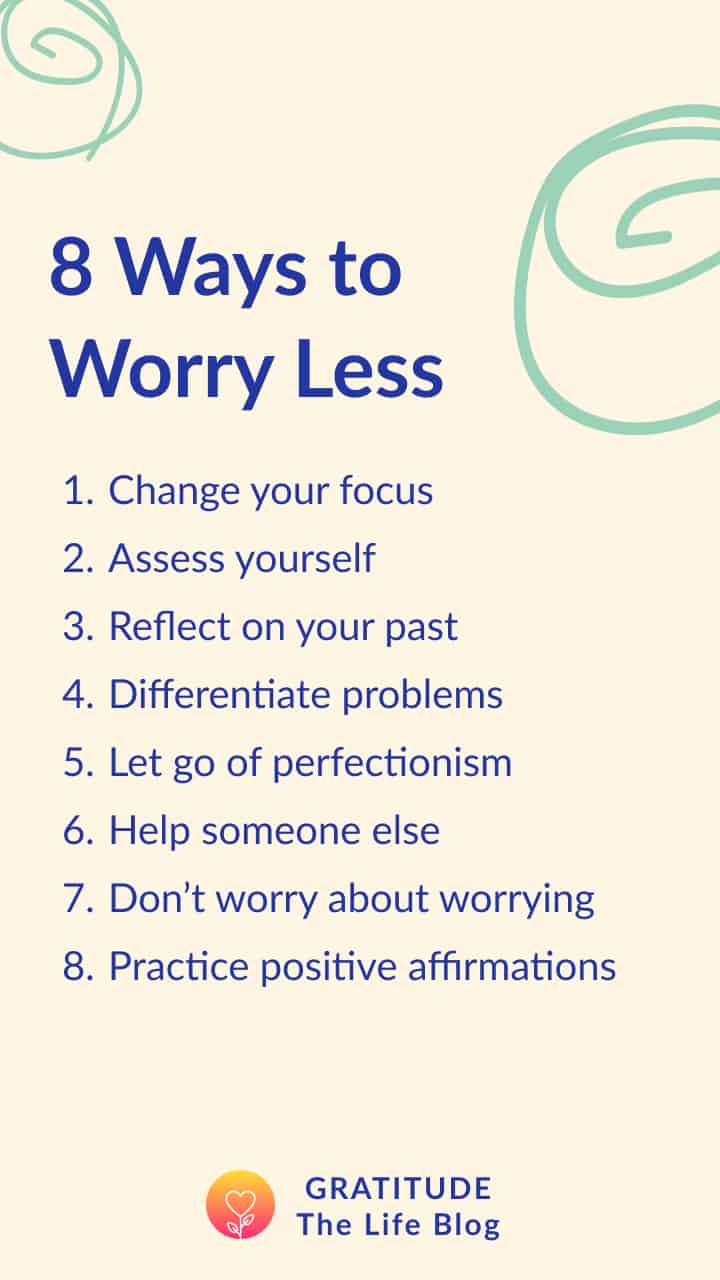8 Easy Ways to Worry Less from Today
Want to stop worrying so much? Here are 8 tips to help you worry less.

"Worry is a misuse of imagination."
In this post, let's learn how we can worry less. A few days ago I stumbled upon the words above and they held me accountable in a way because I love to imagine wonderful things, magical places, fortunate occurrences, but I also worry about useless things.
And, I’ve been wanting to ameliorate the way I think. So, this post is as much for me as it is for you.
The first step: Understand what worry is.
To worry means to feel or show fear and concern because we think that something bad has happened or could happen. It is a response to uncertainty.
When we ponder over what-ifs and take the liberty of imagining all possible (negative) consequences. When we take our thoughts so seriously that we suffer as if they were true. But, they’re just invalidated hypothetical situations running in a frenzy.
We might never escape all amounts of worry, and that’s okay, but we can recognize which issues are genuine and stop when we take them too far.
How to Worry Less
- Change your focus
- Assess yourself
- Reflect on your past
- Differentiate problems
- Let go of perfectionism
- Help someone else
- Don’t worry about worrying
- Practice positive affirmations
1. Change your focus
My mother has always advised me to go out for a walk or do something other than my current activity when I would worry, but silly old me didn’t follow her advice. It was only when I saw my friend intentionally switch his setting and change his focus to help himself that I understood why she asked me to do the same thing.
Go out for a walk, practice deep breathing, talk to a friend, watch a movie, work out, sing songs, do anything except lying or sitting in the same place hoping that worrying more would lead to worrying less.
“My philosophy is that worrying means you suffer twice.”
― Newt Scamander (Fantastic Beasts and Where to Find Them)
2. Assess yourself
Here, ask a bunch of questions:
- Is this going to matter in a week or month or year?
- By worrying, am I handling a problem or creating one?
- How will this help me?
- Are my worries valid?
- Can I do something to help myself?
- Can I also think of positive possibilities?
- Can I spend this mental energy in a better way?
There is immense power in asking good questions (read our post on it here). One good question can suddenly get you on the rail in the right direction.
3. Reflect on your past
How many times in the past have you worried about something and it transpired that it was a waste of time?
Nothing so awful happened but you spent immense energy in fearful anticipation. Most times, things turn out okay, keep reminding yourself of that. One way or another, worrying is not going to help.
A great idea is to keep a worry journal. Write all that comes to your mind. Revisit those pages in a few days and see how things panned out.
With me, my journal reminded me of the worries that I didn't remember just a week later but was so stressed. It helped me realize how I had made myself suffer and learn a lesson.
4. Differentiate problems
One effective way to understand if your worry will reap any good is to recognize if there is a solvable problem at hand or a spiral of imaginary unfortunate incidents.
As the saying goes, “Change what you can, accept what you can’t,” be sure if there is something you can do and then do it. If you’re worried about the quality of your work, then train yourself to do better.
But, if it’s wondering whether something might go wrong in the future, there’s nothing useful here. Whenever you think of a negative possibility, counter it with a positive one at the same time.
5. Let go of perfectionism
What if the root of the problem is the unrealistic expectations that we have for ourselves?
Think about it. Are you as kind to yourself as you are to the people you love? Do you forgive yourself when you make mistakes?
We’re all bound to mess up at times, it is as important to move on from slips as it is to learn from them. You could be great at the learning part, but also give care to not fixate on the crash, another lesson I learned from Pritesh Sankhe (maker of the Gratitude app).
Moving, falling, getting back up, going ahead with more wisdom this time, is what life is.
6. Help someone else
Another great thing to do when you’re stuck with the same disempowering thoughts is to help someone. It can be a small thing like giving a great movie suggestion, visiting a friend who’s going through a tough time.
Or, you can offer food to a homeless person. Getting the focus off of your problems to be there for someone else can be one of the ways to help yourself out.
7. Don’t worry about worrying
This acts as a reminder. Some of us, in a state of worry, even worry about being worried. If you do this, just embrace what your situation is, say: "Right now, I don't feel the best, I have worrying thoughts running in my head. I am sure in some time, I will feel better, this could be a lesson."
8. Practice positive affirmations
And, lastly, improve your self-talk. Regularly practicing positive affirmations can have a significant impact on how you deal with all facets of life. They greatly help in feeling calm, confident and that it will all be okay.
To know more, read our post 'Your Self-Talk Shapes Your Life. Here's How To Do It Right' here.
And, that's all for today. I have immense empathy for the people who tend to worry. I'm sure it comes from good intentions and care, but I also know how taxing it gets.
I hope that at least one of these 8 tips would help you to stop worrying and turn up in your thoughts when you need it.
Have a great day!
Continue Reading: Top 6 Tips to Overcome Self-Doubt
































